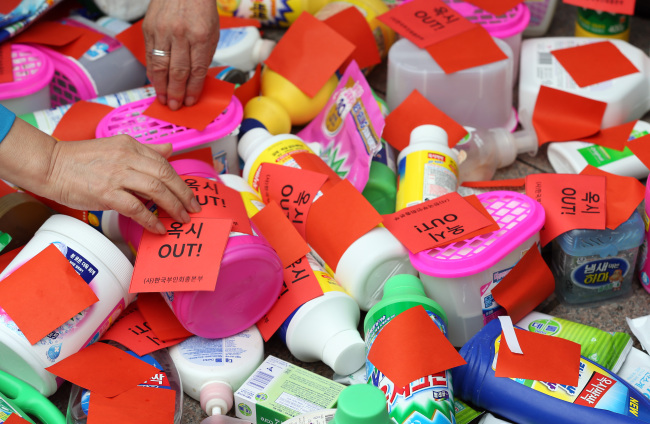The South Korean government should step up efforts in building a chemical-safe society and Oxy Reckitt Benckiser should sincerely apologize to all victims affected by their products since 2006, the United Nations special rapporteur said in a report.
Baskut Tuncak, the UN special rapporteur for human rights and disposal of hazardous substances, underlined the “government’s obligation to protect and realize the rights to life and to enjoy the highest attainable standard of health.” The report was released by the Office of the United Nations High Commissioner for Human Rights, prior to the 33rd session of the Human Rights Council on Tuesday.
Tuncak, a senior attorney and chemist with the Environmental Health Program at the UN, paid an official visit to Korea last October.
The purpose of his 12-day trip was to monitor and assess steps taken by the South Korean government to protect human rights implicated by the management of hazardous substances and chemical wastes.
During his visit, he met with representatives from several government agencies, such as the National Human Rights Commission, and members of civic groups.
Although several administrative measures such as legislation revision for chemical management have taken place since the disinfectant was linked with health impacts in 2011, “the act does not adequately address the very problem that inspired the legislation: the risk that consumers will be exposed to substances without adequate information regarding their health hazards,” said the report.
 |
Yonhap |
Tuncak also blamed the South Korean government for dragging on investigations into related companies’ criminal charges regarding deaths from toxic humidifier disinfectants, as well as lack of access to an effective remedy for all victims.
In May, former CEOs and officials at Oxy Reckitt Benckiser -- formally renamed Reckitt Benckiser Korea in 2014 -- were arrested by the prosecution and fined for falsely advertising their product as “safe to humans.”
Currently, the Ministry of Environment acknowledges victims classified into categories 1 and 2 -- mostly those with severe respiratory related diseases -- to be under state supervision and receive compensation. Civic groups have argued that certain health illnesses can have a long latency period.
The report also criticized companies’ sales of toxic humidifier disinfectants that were “without adequate investigation of their risks to human health and life.”
“Businesses have the responsibility to respect human rights. Business enterprises are expected to carry out human rights due diligence in order to identify, prevent, mitigate and account for how they address their impacts on human rights,” it added.
In addition to the recent announcement by RB Korea in May regarding their commitment to ensure that the victims have access to an effective remedy, the report suggested the company provide a sincere apology to all victims and provide due compensation.
It also suggested RB Korea establish a permanent commemoration at a location of significance and implement measures that will prevent a recurrence of similar incidents as well as share mistakes made and lessons learned with the global community so that other governments and businesses can avoid similar mistakes.
By Kim Da-sol (
ddd@heraldcorp.com)








![[Today’s K-pop] Blackpink’s Jennie, Lisa invited to Coachella as solo acts](http://res.heraldm.com/phpwas/restmb_idxmake.php?idx=644&simg=/content/image/2024/11/21/20241121050099_0.jpg)